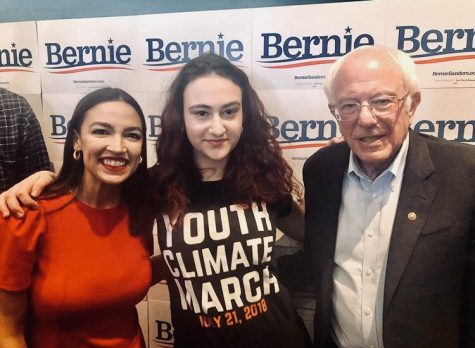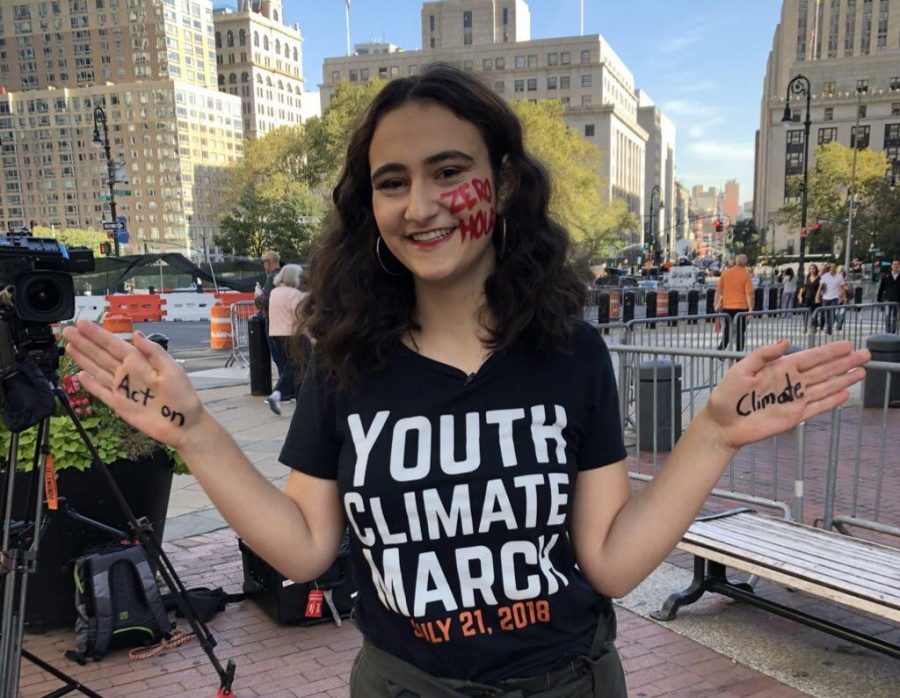‘A Costco food sample of climate justice’: Tisch sophomore Jamie Margolin launches scholarship
The Climate Justice Scholarship will be awarded to one high school, university or trade school student who is passionate about combating the climate crisis.
Jamie Margolin, an NYU sophomore, launches a high school scholarship that aims to push the discussion of climate justice. Applicants are asked to think about steps to take for climate justice. (Image courtesy of Jamie Margolin)
September 21, 2021
Tisch sophomore Jamie Margolin knows that $1,000 will not solve the global issues many students are passionate about. But Margolin, 19, is hoping that her new Climate Justice Scholarship will allow budding activists such as herself to start tackling the climate crisis.
“I wanted to be able to give funding that would have helped me,” Margolin said. “I definitely would have 100% applied to something like this in order to give a little more resources to the work I was doing or to my school fund.”
The $1,000 scholarship will be awarded to a student at a U.S. high school, college or trade school. Applicants are asked to pick one of three articles on the climate — relating to indigenous rights, capitalism or racial justice — and answer two essay questions regarding their personal experience learning about the crisis and concrete steps that can be taken toward climate justice. Margolin launched the award through Access Scholarships, an online platform that allows students to launch their own scholarship opportunities. The deadline to apply is April 15, 2022.
“I’m essentially wanting to give people a sample — a Costco food sample of climate justice,” Margolin said. “[The essay] should be something that would actually make sense in real life and could be implemented realistically. Every person brings something special to their organizing and their activism through who they are through their own talents.”
Margolin — a Jewish-Colombian-American activist, author, speaker and filmmaker — co-founded Zero Hour, an international youth climate justice movement with 200 chapters worldwide, in 2017. She has also led youth climate marches in Washington, D.C. and over 25 other cities.

“I created this scholarship because getting started and finding the resources to take action on issues I care about can be overwhelming and exhausting,” Margolin said. “I’m a big believer in creating what you wish you had, and I live by that.”
CAS environmental studies senior Adriana Moreno, who said she will be applying, was excited to see that the scholarship focuses on action, not just awareness.
“I’m really happy that it is solution-oriented rather than getting people stuck into that very dark depressing place, being like, ‘OK, what can we do, what can the government do and what can activists, organizations do,’” Moreno said. “It’s not unsolvable, even though it feels like it.”
Margolin was inspired by Ayden Berkey, the co-founder of Access Scholarships. Berkey started the scholarship search platform with her uncle after graduating college and is launching scholarships from the site herself.
“I think students really like to apply for scholarships that are based on current events,” Berkey said. “It’s really starting to scare me how much our world is changing on a daily basis because of the impacts of climate change, and we’ve been passive for too long. It’s people like Jamie who are really working to change the narrative, and so that’s really what I hope students are getting out of this scholarship.”
Moreno was struck by the fact that academic scholarships are now taking the climate crisis, and youth activists’ response to it, more seriously.
“I feel like it isn’t something that would have come up five years ago or 10 years ago,” Moreno said. “I’m happy that that scholarship even exists because I feel like it’s important to let people know — especially younger people — that this is a topic worth investing in. This isn’t niche.”
In the future, once the first winner is chosen, Margolin hopes her fund will grow in size.
“Ideally, if this scholarship in the future is bigger, it’s the equivalent of maybe how much a student would make at a part-time job that they can instead use this money to fund themselves, to do the work,” Margolin said. “I’d like this to be available to more and more people and have more and more funding.”
Margolin says that in a perfect world, she and Access Scholarships would offer at least three people a $5,000 dollar stipend each.
“I’m not pretending that this one $1,000 stipend is like I’m solving everything, but I’m saying that this is the start,” Margolin said. “This is the launch.”
Contact Laura Beard at [email protected].


























































































































































